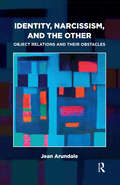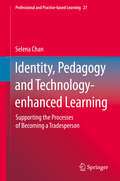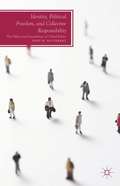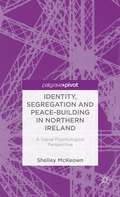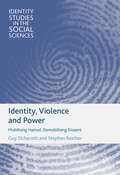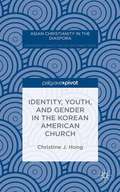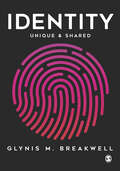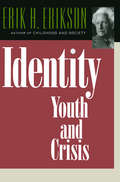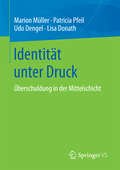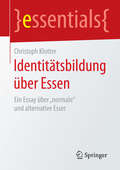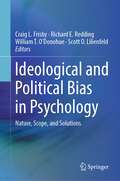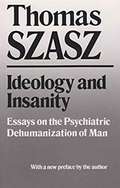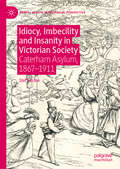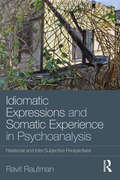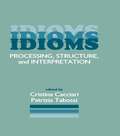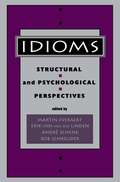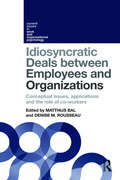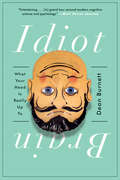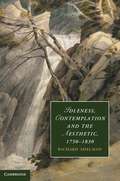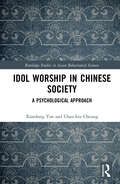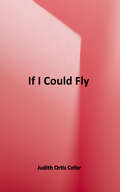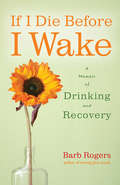- Table View
- List View
Identity, Narcissism, and the Other: Object Relations and their Obstacles
by Jean ArundalePractitioners of psychoanalysis find three central themes to be recurrent and ubiquitous in every analysis; firstly, issues around identity, the struggle to know the self, to understand the self and to be the self in an authentic way. Intricately entangled with self-identity is the problem of narcissism, essentially viewed as a defensive retreat to a mental state characterized by an unconscious belief in the special value of the self and the diminution of the Other. However, there are a multitude of inherent anxieties involved in close and intimate relationships. As Freud pointed out, even in our most intimate relationships there is an element of hostility. Threats to both the self and other, and various anxieties around libidinal contact, will be examined in this book using case material, and the relationship between these three important themes, identity, narcissism and the other, separate but interconnected, will be explored.
Identity, Pedagogy and Technology-enhanced Learning: Supporting the Processes of Becoming a Tradesperson (Professional and Practice-based Learning #27)
by Selena ChanThis book gathers work from over a decade of study, and seeks to better understand and support how learners become tradespeople. The research programme applies recent concepts from neuroscience, educational psychology and technology-enhanced learning to explain and help overcome the challenges of learning in trades-learning contexts. Due to the complex and multifarious nature of the work characterising trade occupations, learning how to become a tradesperson requires a significant commitment in terms of time, along with physical and cognitive effort. All modalities (visual, aural, haptic etc.) and literacies (text, numerical, spatial etc.) are required when undertaking trade work. Manual dexterity and strength, coupled with the technical and tacit knowledge required for complex problem solving, not to mention suitable dispositional approaches, must all be learnt and focused on becoming a tradesperson.However, there is a substantial gap in the literature on 'how people learn a trade' and 'how to teach a trade'. In this book, contemporary teaching and learning approaches and strategies, as derived through practice-based participatory research, are used to highlight and discuss pragmatic solutions to facilitate the learning and teaching of trade skills, knowledge and dispositions. The approaches and strategies discussed include the implementation of technology-enhanced learning; project-based inquiry/problem-based learning; and recommendations to ensure learners are prepared for the future of work.
Identity, Political Freedom, and Collective Responsibility
by Eddy M. SouffrantEddy M. Souffrant calls for a reassessment of the starting points of moral, social, and political philosophy that takes into account the actual living circumstances of persons living the 21st century.
Identity, Segregation and Peace-Building in Northern Ireland: A Social Psychological Perspective
by Shelley MckeownHaving experienced over 30 years of violent conflict, Northern Ireland acts as an interesting case study in which to examine the causes and consequences of political violence. At the same time this society provides a number of important peace-building lessons for other conflicted societies across the globe. Whilst there are a plethora of books examining the Northern Ireland 'problem', Identity, segregation and peace-building in Northern Ireland stands out from the crowd as being succinct and offering a unique social psychological perspective. It provides an overview of some of the key issues relating to the conflict and its maintenance along with a list of further recommended reading for those interested in delving further. This is an accessible book for anyone interested in understanding more about the conflict in Northern Ireland, or for those who are interested in conflict, identity and peace-building more generally.
Identity, Violence and Power: Mobilising Hatred, Demobilising Dissent (Identity Studies in the Social Sciences)
by Guy Elcheroth Stephen ReicherThis book provides a systematic examination of the re-patterning of collective identities through violence and the role of power politics in such critical transitions. The authors show how identity is created through shared social practices and how it is transformed when collective violence disrupts common practices. Three case studies show how this model sheds new light on the dynamics of religious violence in parts of India, on ethnic violence in the former Yugoslavia, as well as on anti-war protest in the UK in reaction to the military invasion of Iraq. The book explores an alternative way of looking at conflict, and dissects the policies and processes that bring specific identities to the fore, taking seriously the capacity to resist and face abusive authority. Identity, Violence and Power will be of interest to students and scholars of sociology, social psychology, history, political science and conflict studies.
Identity, Violence and Power: Mobilising hatred, Demobilising Dissent (Identity Studies in the Social Sciences)
by Guy Elcheroth Stephen ReicherThis book provides a systematic examination of the re-patterning of collective identities through violence and the role of power politics in such critical transitions. The authors show how identity is created through shared social practices and how it is transformed when collective violence disrupts common practices. Three case studies show how this model sheds new light on the dynamics of religious violence in parts of India, on ethnic violence in the former Yugoslavia, as well as on anti-war protest in the UK in reaction to the military invasion of Iraq. <p><p> The book explores an alternative way of looking at conflict, and dissects the policies and processes that bring specific identities to the fore, taking seriously the capacity to resist and face abusive authority. <p> Identity, Violence and Power will be of interest to students and scholars of sociology, social psychology, history, political science and conflict studies.
Identity, Youth, and Gender in the Korean American Church
by Christine J. HongThis book studies Korean American girls between thirteen and nineteen and their formation with regard to self, gender, and God in the context of Korean American protestant congregational life. It develops a hybrid methodology of de-colonial aims and indigenous research methods, aiming to facilitate transformative life in faith communities.
Identity: Unique and Shared (Psychology Library Editions: Social Psychology Ser.)
by Glynis M. BreakwellWhat do we know about identity processes and how does this relate to the world we live in? This book answers this question by considering the contemporary major developments in identity process theory – a framework founded by the author in the 1980s for understanding the coping strategies used when identity is threatened. With a focus on issues ranging from group conflict to dementia and mental illness, as well as contemporary events and phenomena such as the rise of the Digital Era and the COVID-19 pandemic, Identity explores how building and defending a unique identity motivates our thoughts, feelings, and actions. Breakwell brings together ideas of personal identity and social identity to show us how they intersect with one another. This book is essential reading for psychology students and researchers, and those interested in the concept of identity in the social sciences more broadly. Dame Glynis M. Breakwell is Professor Emeritus at the University of Bath and has Visiting Professorships at Imperial College, London and University of Surrey.
Identity: Unique and Shared (Psychology Library Editions: Social Psychology Ser.)
by Glynis M. BreakwellWhat do we know about identity processes and how does this relate to the world we live in? This book answers this question by considering the contemporary major developments in identity process theory – a framework founded by the author in the 1980s for understanding the coping strategies used when identity is threatened. With a focus on issues ranging from group conflict to dementia and mental illness, as well as contemporary events and phenomena such as the rise of the Digital Era and the COVID-19 pandemic, Identity explores how building and defending a unique identity motivates our thoughts, feelings, and actions. Breakwell brings together ideas of personal identity and social identity to show us how they intersect with one another. This book is essential reading for psychology students and researchers, and those interested in the concept of identity in the social sciences more broadly. Dame Glynis M. Breakwell is Professor Emeritus at the University of Bath and has Visiting Professorships at Imperial College, London and University of Surrey.
Identity: Youth and Crisis
by Erik H. EriksonIdentity: Youth and Crisis collects Erik H. Erikson's major essays on topics originating in the concept of the adolescent identity crisis. Identity, Erikson writes, is an unfathomable as it is all-pervasive. It deals with a process that is located both in the core of the individual and in the core of the communal culture. As the culture changes, new kinds of identity questions arise--Erikson comments, for example, on issues of social protest and changing gender roles that were particular to the 1960s. Representing two decades of groundbreaking work, the essays are not so much a systematic formulation of theory as an evolving report that is both clinical and theoretical. The subjects range from "creative confusion" in two famous lives--the dramatist George Bernard Shaw and the philosopher William James--to the connection between individual struggles and social order. "Race and the Wider Identity" and the controversial "Womanhood and the Inner Space" are included in the collection.
Identität unter Druck
by Marion Müller Patricia Pfeil Udo Dengel Lisa DonathDie Autor_innen untersuchen Identitätsstrategien von Paaren aus der Mittelschicht, die unter Überschuldungsdruck geraten. Sie gehen aufgrund biografischer Interviews, die in einer qualitativen Paneluntersuchung in drei Wellen erhoben wurden, der Frage nach, wie im Paar an der Identität gearbeitet wird und wie sich Identität verändert, wenn sozialer Abstieg droht. Die theoriegenerierende Analyse bringt Muster des Umgangs mit Überschuldung und der Selbstplatzierung hervor, die entlang der Begriffe ‚Kontinuität‘, ‚Modifikation‘ und ‚Moratorium‘ beschrieben werden. Ebenso gehen sie der Frage nach, wie die Lebenswelt in und mit Überschuldung als Paar konstruiert wird.
Identitätsbildung über Essen: Ein Essay über „normale“ und alternative Esser (essentials)
by Christoph KlotterChristoph Klotter widmet sich der Frage, auf welche Weise Ernährungsgewohnheiten unsere kulturelle und soziale Identität prägen und warum ausgerechnet das Thema Essen so wichtig für unser Selbstverständnis ist. Der Autor erläutert die Geschichte der Esskultur von Pythagoras und Platon bis hin zu den Ernährungsformen der modernen Avantgarde. Dabei geht er auf die Bedeutung von Essgewohnheiten innerhalb der Familie, verbreitete Essstörungen, Bewegungen wie Vegetarismus und Veganismus sowie kulturelle und ethische Fragen des Fleischkonsums ein.
Identitätskonzepte in Michael Endes Werk (Abhandlungen zur Literaturwissenschaft)
by Anna BraunDiese Studie befasst sich mit den vielfältigen Identitätskonzepten im Werk von Michael Ende, vor allem mit Patchwork- und Geschlechtsidentitäten, kulturellen und hybriden Identitäten. Es wird gezeigt, wie die Figuren Identitäten konstruieren, welche Faktoren, Fähigkeiten und Ressourcen hierbei zum Gelingen oder Scheitern beitragen und welche Identitätsfragen in den Texten verhandelt werden. Auch die vielschichtigen Potentiale für die Identitätsarbeit der Leser*innen werden aufgezeigt und Impulse für den identitätsorientierten Literaturunterricht diskutiert. Die zu den Entstehungszeiten der Texte virulenten Diskurse und außertextuellen Konzepte werden einbezogen und ihre Verarbeitung in den Texten wird verdeutlicht, um ihre Verknüpfung mit identitätsrelevanten Fragen darstellen zu können. Analysiert werden die von der Forschung beachteten, mit Preisen ausgezeichneten und international rezipierten Texte, aber auch unbekanntere und von der Forschung bisher kaum beachtete Texte, darunter solche, die vor allem an Erwachsene adressiert sind.
Ideological and Political Bias in Psychology: Nature, Scope, and Solutions
by Scott O. Lilienfeld Craig L. Frisby William T. O’Donohue Richard E. ReddingThis book examines the traditional assumptions made by academics and professionals alike that have embedded sociopolitical biases that impede practice. and undermine efforts to achieve an objective scientific status. If allowed to go unchallenged, the credibility of psychology as a discipline is compromised. This contributed volume thoroughly and comprehensively examines this concern in a conceptually and empirically rigorous manner and offers constructive solutions for minimizing undue political influences within the field of psychology. Societies in the 21st century desperately need reliable psychological science, but we don’t have it. This important volume explains one of the main reasons why we are making little progress on any issue that gets contaminated by the left-right culture war: because the field of psychology is an enthusiastic member of one of the two teams, so it rejects findings and researchers who question its ideological commitments. The authors of this engaging volume also show us the way out. They diagnose the social dynamics of bias and point to reforms that would give us the psychology that we need to address 21st century problems. Jonathan Haidt, Thomas Cooley Professor of Ethical Leadership, NYU—Stern School of Business and author of The Righteous Mind The boundaries of free speech, censorship, moral cultures, social justice, and ideological biases are among the many incendiary topics discussed in this book. If you are looking for a deep-dive into real-world contemporary controversies, Ideological and Political Bias in Psychology fits the bill. The chapters are thoughtful and thought-provoking. Most readers will find something to agree with and something to rage at in almost every chapter. It just may change how you think about some of these topics. Diane F. Halpern, Professor of Psychology Emerita, Claremont McKenna College and Past President, American Psychological Association Unless the political left is always correct about everything (in which case, we wouldn’t need to do research; we could just ask a leftist), the growing political monoculture of social science is a major barrier to our search for the truth. This volume shows how ideological bias should be treated as a source of research error, up there with classic methodological flaws like non-random assignment and non-blind measurement. Steven Pinker, Johnstone Professor of Psychology, Harvard University, and the author of Rationality An important read for academics curious about how their politics fashions beliefs that too often are uncritically taken for granted, and for non-academics wondering why we can't shake off the politics that so influences scientific work. Vernon Smith, Nobel Laureate in Economic Sciences and George L. Argyros Chair in Finance and Economics, Chapman UniversityAdvances and deepens empirically rigorous scholarship into biased political influences affecting academic and professional psychology.Offers constructive solutions for minimizing undue political influences within psychology and moving the field forward.Serves as a resource for psychological academicians, researchers, practitioners, and consultants seeking to restore the principles of accurate science and effective practice to their respective areas of research.
Ideology and Insanity: Essays on the Psychiatric Dehumanization of Man
by Thomas SzaszThis book is a collection of the earliest essays of Thomas Szasz, in which he staked out his position on “the nature, scope, methods, and values of psychiatry.” On each of these issues, he opposed the official position of the psychiatric profession. <p><p>Where conventional psychiatrists saw themselves diagnosing and treating mental illness, Szasz saw them stigmatizing and controlling persons; where they saw hospitals, Szasz saw prisons; where they saw courageous professional advocacy of individualism and freedom, Szasz saw craven support of collectivism and oppression.
Idiocy, Imbecility and Insanity in Victorian Society: Caterham Asylum, 1867–1911 (Mental Health in Historical Perspective)
by Stef EastoeThis book explores the understudied history of the so-called ‘incurables’ in the Victorian period, the people identified as idiots, imbeciles and the weak-minded, as opposed to those thought to have curable conditions. It focuses on Caterham, England’s first state imbecile asylum, and analyses its founding, purpose, character, and most importantly, its residents, innovatively recreating the biographies of these people. Created to relieve pressure on London’s overcrowded workhouses, Caterham opened in September 1870. It was originally intended as a long-stay institution for the chronic and incurable insane paupers of the metropolis, more commonly referred to as idiots and imbeciles. This purpose instantly differentiates Caterham from the more familiar, and more researched, lunatic asylums, which were predicated on the notion of cure and restoration of the senses. Indeed Caterham, built following the welfare and sanitary reforms of the late 1860s, was an important feature of the Victorian institutional landscape, and it represented a shift in social, medical and political responsibility towards the care and management of idiot and imbecile paupers.
Idiomatic Expressions and Somatic Experience in Psychoanalysis: Relational and Inter-Subjective Perspectives
by Ravit RaufmanIdiomatic Expressions and Somatic Experience in Psychoanalysis examines how verbal and non-verbal language is used in the consulting room, and how those different modes of communication interact to provide a more comprehensive picture of the patient's relational world. It is the product of a comprehensive research project exploring the affinity between idiomatic expressions and somatic behaviors and symptoms. Idiomatic expressions are viewed as bridging the gap between somatic sensations and mental experiences. Ravit Raufman deals with one of the fundamental aspects in human life- the way our behavior is governed by unconscious primary experiences, suggesting methods by which to decipher patient behaviors that are apparently detached and unreasonable. The first part presents case studies of people who enact and revive verbal idiomatic expressions through their behavior. The second describes how therapists use non-verbal mechanisms, operating in their own minds, to understand their patients’ inner lives. Based on relational and inter-subjective approaches in psychoanalysis, the case studies illustrate the various ways in which the therapist's subjective experience is "objectively" used to learn about patients’ subjective relational experience, so as to verbally formulate experiences that are pre-verbal. Raufman combines Freudian ideas regarding the affinity between somatic symptoms and verbal expressions, with a contemporary relational perspective. The book combines scientific findings with a narrative style, including life-stories of various individuals, as well as a description of the therapist's own subjective experience. This book will appeal to clinical psychologists and psychoanalytic psychotherapists as well as anyone interested in understanding human psyche and behavior.
Idioms: Processing, Structure, and Interpretation
by Cristina Cacciari Patrizia Tabossi"The book draws on a lot of research, is friendly to the reader, and will be of good value to teachers." Paul Nation, Victoria University of Wellington, Australia This comprehensive, up-to-date, and accessible text on idiom use, learning, and teaching approaches the topic with a balance of sound theory and extensive research in cognitive linguistics, psycholinguistics, corpus linguistics, and sociolinguistics combined with informed teaching practices. Idioms is organized in three parts: Part I includes discussion of idiom definition, classification, usage patterns, and functions. Part II investigates the process involved in the comprehension of idioms and the factors that influence individuals’ understanding and use of idioms in both L1 and L2. Part III explores idiom acquisition and the teaching and learning of idioms, focusing especially on the strategies and techniques used to help students learn idioms. To assist the reader in grasping the key issues, study questions are provided at the end of each chapter. The text also includes a glossary of special terms and an annotated list of selective idiom reference books and student textbooks. Idioms is designed to serve either as a textbook for ESL/applied linguistics teacher education courses or as a reference book. No matter how the book is used, it will equip an ESL/applied linguistics students and professionals with a solid understanding of various issues related to idioms and the learning of them.
Idioms: Structural and Psychological Perspectives
by Martin Everaert André Erik-Jan van der Linden Rob SchreuderIdioms have always aroused the curiosity of linguists and there is a long tradition in the study of idioms, especially within the fields of lexicology and lexicography. Without denying the importance of this tradition, this volume presents an overview of recent idiom research outside the immediate domain of lexicology/lexicography. The chapters address the status of idioms in recent formal and experimental linguistic theorizing. Interdisciplinary in scope, the contributions are written by psycholinguists and theoretical and computational linguists who take mutual advantage of progress in all disciplines. Linguists supply the facts and analyses psycholinguists base their models and experiments on; psycholinguists in turn confront linguistic models with psycholinguistic findings. Computational linguists build natural language processing systems on the basis of models and frameworks provided by theoretical linguists and, sometimes psycholinguists, and set up large corpora to test linguistic hypotheses. Besides the fascination for idioms that make up such a large part of our knowledge of language, interdisciplinarity is one of the attractions of investigations in idiomatic language and language processing.
Idiosyncratic Deals between Employees and Organizations: Conceptual issues, applications and the role of co-workers
by Matthijs Bal Denise M RousseauIdiosyncratic deals, or i-deals, are the individualised working arrangements negotiated by employees with the organizations for which they work. Such deals represent an emerging area of study into the effects they have on both parties, as well as co-workers and the wider working world. Do i-deals signify a further breakdown of collectivism within the workplace, or should they be seen as empowering to those employees able to find themselves the best deal? Is the growth of i-deals an inevitable response to the need for more flexible working relationships, or do they erode concepts of equality and fairness? In this important new collection, i-deals are discussed from a comprehensive range of viewpoints. The book examines how i-deals alter the psychological relationship between employee and employer, as well as the notion of career development in an aging and technologically literate workforce. The issue of group relationships is also discussed, in relation to leadership theories, organizational justice and perceived fairness. Finally, the impact on organizational and individual effectiveness is assessed. Are i-deals a good thing for employers looking to maximise productivity within an organization? Do employees work more effectively and efficiently as a consequence of i-deals? Very much a hot topic, this volume represents a key contribution in the area of i-deals from the most active researchers in the field. It will be important reading for all students of work and organizational psychology, human resource management and business management.
Idiot Brain: What Your Head Is Really Up To
by Dean BurnettA neuroscientist's delightful tour of our mysterious, mischievous, entirely fallible gray matter. It's happened to all of us at some point. You walk into the kitchen, or flip open your laptop, or stride confidently up to a lectern, filled with purpose—and suddenly haven't the foggiest idea what you’re doing. Welcome to your idiot brain. Yes, it is an absolute marvel in some respects—the seat of our consciousness, the pinnacle (so far) of evolutionary progress, and the engine of all human experience—but your brain is also messy, fallible, and about 50,000 years out-of-date. We cling to superstitions, remember faces but not names, miss things sitting right in front of us, and lie awake at night while our brains replay our greatest fears on an endless loop. Yet all of this, believe it or not, is the sign of a well-meaning brain doing its best to keep you alive and healthy. In Idiot Brain, neuroscientist Dean Burnett celebrates blind spots, blackouts, insomnia, and all the other downright laughable things our minds do to us, while also exposing the many mistakes we've made in our quest to understand how our brains actually work. Expertly researched and entertainingly written, this book is for everyone who has wondered why their brain appears to be sabotaging their life, and what on earth it is really up to.
Idleness, Contemplation and the Aesthetic, 1750–1830
by Richard AdelmanReconstructing the literary and philosophical reaction to Adam Smith's dictum that man is a labouring animal above and before all else, this study explores the many ways in which Romantic writers presented idle contemplation as the central activity in human life. By contrasting the British response to Smith's political economy with that of contemporary German Idealists, Richard Adelman also uses this consideration of the importance of idleness to Romantic aesthetics to chart the development of a distinctly British idealism in the last decades of the eighteenth century. Exploring the work of Adam Smith, Jeremy Bentham, Friedrich Schiller, William Cowper, Samuel Taylor Coleridge, Mary Wollstonecraft and many of their contemporaries, this study pinpoints a debate over human activity and capability taking place between 1750 and 1830, and considers its social and political consequences for the cultural theory of the early nineteenth century.
Idol Worship in Chinese Society: A Psychological Approach (Routledge Studies in Asian Behavioural Sciences)
by Xiaodong Yue Chau-kiu CheungThis book introduces psychosocial studies of idol worship in Chinese societies. It reviews how idol worship is perceived in Chinese culture, history, and philosophy as well as how it differs from the concept of celebrity worship that is more dominant in Western literature. Using a pioneering hexagonal model of idol worship, this book explains how idol worship is affected by various demographic and dispositional variables as well as the cognitive and social functions of idols and idol worship. Finally, it discusses idol worship from a contemporary Chinese perspective, including emotional, interpersonal, and social learning aspects, and ends with a discussion of moral development perspective.
If I Could Fly: With Characters from an Island Like You
by Judith Ortiz CoferWhen fifteen-year-old Doris's mother, a professional singer, returns to Puerto Rico and her father finds a girlfriend, Doris cares for a neighbor’s pigeons and relies on friends as she begins to find her own voice and wings.
If I Die Before I Wake: A Memoir of Drinking and Recovery
by Barb RogersBarb Rogers’ book begins with the tragic death of her teenage son, Jon, and delves into the horror that was her life to that point. Due to a home life fraught with substance and emotional abuse, Barb found herself bottomed out more than once, and homeless along the way. “When asked in early recovery if I knew any prayers, the one I could think of was the child’s nighttime prayer, ‘Now I lay me down to sleep.’ As I thought of it, I recalled the long nights when I simply wanted to go to sleep and never wake up.” Barb learned most of her life lessons through pain, tragedy, and addiction. This is not a glamorous book, it is real and it is raw. It is not about survival of the fittest, but the weak, the hopeless, the helpless, the truly addicted, not only to substances, but to drama, anger, excuses, and justifications. She describes how she got to her lowest point, just what it was, and how and why she finally reached out to a 12-step program for help. She shows the reader what it’s really like to survive, to stay clean and sober, and find a way to the other side. Recovery was one of the most difficult things she ever did, but “worth every effort I put out.” Barb Rogers would be the first to tell you she’s not special--she’s led a hard life, and she tells her story well and with humor--readers--addicts or not, but especially addicts--are going to find the kind of gritty inspiration, that if Barb can do it so can they, that will inspire life changes.
